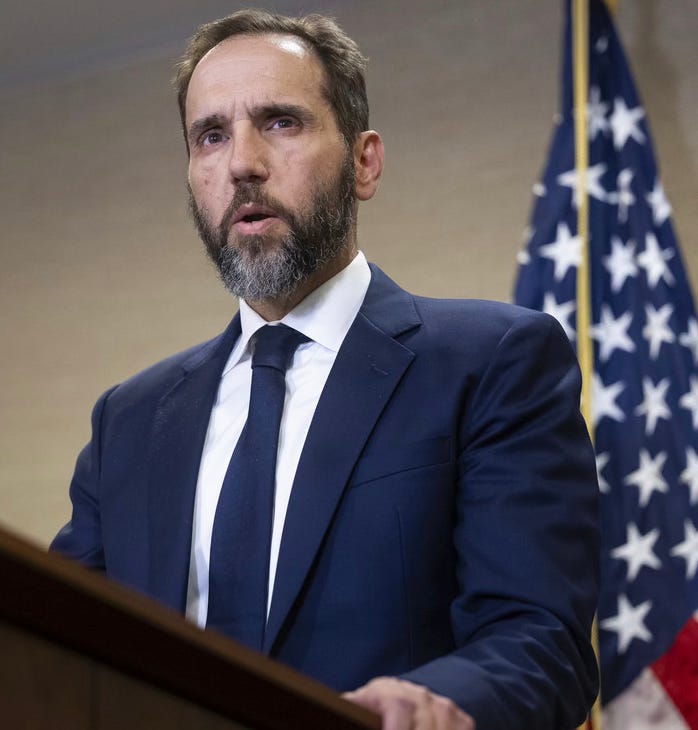Was the attempted appointment of Jack Smith as Special Prosecutor Valid? On November 15, 2022, President Trump announced his candidacy for the presidency in 2024. Just three days later, on November 18, 2022, Attorney General Merrick Garland announced that he was appointing Jack Smith as Special Counsel to investigate President Trump.
Coincidence?
Probably not.
To quote Yogi Berra: “That is too coincidental to be a coincidence.”
Did it take the three days between the 15th and the 18th of November for Garland to name, and reach, Smith, who was living in the Netherlands with his wife Katy Chevigny as she was working with Michelle Obama on a documentary about the former first lady’s life called “Becoming.”
Garland sent his appointment documents naming “Jack Smith” as Special Counsel to Smith for his completing the appointment process of signing it and taking the oath of office with a witness.
Smith, after relocating to D.C. in December 2020, acting as Special Counsel, formed a team of prosecutors and began alleging crimes committed by President Trump, which included Trump’s alleged failure to follow the rules for record keeping, oh, and conspiracy for the activities of Jan 6, 2021. Interestingly, the Democrats and the mainstream media continue to assert that Trump is charged with “insurrection”; neither the Special Counsel, nor any other prosecutor, has ever charged President Trump with “insurrection.”
The Federal Judge, Tanya Chutkan (the only judge to sentence those convicted of Jan 6 violations to longer jail sentences than recommended by the prosecutors), scheduled the Special Counsel’s Jan 6 case for March 4, 2024, the day before Super Tuesday, when 15 states hold their Republican primaries or caucuses.
However, since the question of whether President Trump had “Presidential Immunity,” would determine if there could even be a trial, the question of immunity had to be decided before any trial.
Since every previous president in our nation’s had “Presidential Immunity,” Trump’s lawyers appealed to the D.C. appellate court to reverse Judge Chutkan’s denial of his immunity.
Smith – worried that Trump’s right to appeal any decision to the U.S. Supreme Court would delay the trial date until after the campaign season – tried to get the Supreme Court to issue an expedited ruling. The Supreme Court declined and sent the case back to the appellate court.
However, in the short time the case was before the Supreme Court, former Attorney General Ed Meese filed an Amicus Curie (“friend of the court”) brief alleging that since Jack Smith was not a valid Special Counsel, any of his actions were null and void.
Meese’s brief, which now sits in front of the D.C Court of Appeals, asserts the following three reasons why “Jack Smith” is not a valid Special Counsel:
“The Special Counsel shall be selected from outside the United States Government” (29 CFR 600.3) where ‘CFR” stands for Code of Federal Regulations. Smith was working for the government as a prosecutor in The International Criminal Court (ICC).
Becoming a Special Counsel requires that certification must be signed by the person and the Oath of Office executed, with a witness, within 30 days of the signature. In November 2022, Smith signed the document but it and the Oath, were not witnessed. This omission was considered serious enough that the DOJ legal department notified Smith in the summer of 2023 that he needed to have his signature and oath witnessed, which he did, some 228 days after signing the document. The taking of the oath is so important that, for example, any actions a “president elect” may try to implement before becoming “president” are null and void. Smith’s indictments of Trump were before he completed the oath.
The name Attorney General Garland put on the certification was “Jack Smith,” which is not the name of the person trying to act as Special Counsel, which is “John Luman Smith.” Note that Luman did not correct the error.
Should the Appeals Court, or subsequently the U.S. Supreme Court, decide that the “irregularities” (such a gentle word for failure to follow the rules) committed by the United States Attorney General and/or “John Luman Smith” were significant enough to void the appointment of John Luman Smith,” then all the actions Jack Smith took as “Special Counsel” should be null and void, including the indictments of Donald Trump.
After all, no one is above the law.
Right?



Thanks for providing me an opportunity to address your concerns. This piece was about whether Meese's Amicus Brief raised issues that might disqualify Smith's actions as Special Counsel. I did include that all president's had "Presidential Immunity:" I did not write that this was "Absolute Immunity."
Also, if every previous president had absolute immunity from criminal prosecution for actions while he is in office, then why did Nixon need a pardon from President Ford to avoid being tried for charges arising from the Watergate case?